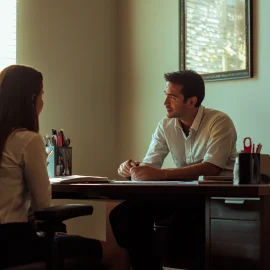

This article is an excerpt from the Shortform book guide to "The Practice" by Seth Godin. Shortform has the world's best summaries and analyses of books you should be reading.
Like this article? Sign up for a free trial here.
Why is creative feedback important for artists? How can feedback make you better?
In his book The Practice, Seth Godin shares tips and tricks to improve your creative skills. He says that after you finish a project, you should ask for feedback from others, but also not pay attention to a lot of criticism.
Check out Godin’s advice for effectively using creative feedback.
Creative Feedback
When you share your work, some of it might work for some people, but not others; some of it might not work at all. The goal is not to get reassurance from your audience; it’s to incorporate useful, creative feedback to make your work better.
Godin points out that a lot of criticism isn’t worth paying attention to. This includes criticism from internet trolls or people who aren’t your intended audience. For example, people who like meandering, lyrical ballads aren’t going to like your rap music, so it doesn’t matter what they have to say.
The only criticism worth paying attention to is criticism from people who tell you what’s not working for them without indicting you personally.
How to Use Creative Feedback Effectively
It’s one thing to say, “Share your work (even if it’s bad!),” it’s quite another thing to actually do it. Many of us are afraid of what others will think of our work—not only do we want to avoid criticism, but we’re also overly attached to praise. So what can we do to handle feedback effectively and use it to our creative advantage?
Godin addresses this to some extent when he talks about reassurance and how seeking praise won’t help your work. He also discusses the difference between useful and useless criticism. Other books on creativity overlap with this advice, while also presenting additional ideas about evaluating, filtering, and incorporating feedback. In Playing Big, for example, Tara Mohr shares the following tips for detaching ourselves from caring too much about praise and criticism:
1. It’s not about you. Feedback doesn’t tell you about your own worth, it only tells you about the person giving the feedback and their preferences and opinions. Mohr also says that the purpose of feedback is not to inflate or deflate your ego, or to tell you whether your work is “bad” or “good”; it’s to give you information about whether you’re reaching your intended audience.
2. Don’t worry about what family, friends, or “experts” think. Family and friends may try to be supportive—or they may project their fears onto you—but usually, they don’t have the information you need to properly evaluate your creative project. And if you’re working on something brand new, experts in your field may not understand what you’re trying to do either, or they may feel threatened by it. The most important people to get feedback from are your intended audience and the decision makers you need to influence or reach. Then, take the feedback that’s strategically useful to you and leave the rest.
3. Criticism doesn’t mean you’ve done something wrong. Criticism doesn’t mean you’ve made a mistake. On the contrary, criticism is inevitable whenever you put important work into the world. Need proof? Mohr suggests reading the top positive and negative book reviews for any bestseller to bring home the point that any significant work draws a wide range of reactions.

———End of Preview———
Like what you just read? Read the rest of the world's best book summary and analysis of Seth Godin's "The Practice" at Shortform.
Here's what you'll find in our full The Practice summary:
- Why creativity doesn't require any “magic”
- How creativity is a skill that anybody can learn
- Step-by-step lessons on how to be creative






